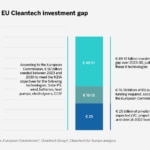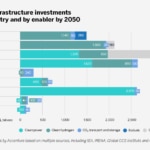"Cleantech investment, an opportunity for Europe"
Antoni Ballabriga, Global Head of Sustainability Intelligence & Advocacy at BBVA, analyzes the importance of technological innovation and cleantech investment in an article published in the latest issue of the magazine 'Estrategias de Inversión'.

According to the International Energy Agency, the technologies available on the market needed to achieve net zero emissions by 2050 increased their weight from 50% to 65% between 2021 and 2023. While innovation is allowing us to keep alive the possibility of achieving net zero emissions, the window is gradually closing and we still have a long way to go.
At BBVA we believe that this transformation will only happen if it makes economic sense and is just. And technological innovation plays a key role in making this possible. On one level we have those technologies with no green cost premium and which are already primed for mass implementation, such as renewable energies, energy efficiency and electric mobility. We then have a second level featuring those technologies that are still incipient and need to be scaled up to become economically viable. Here we have those sectors that are difficult to decarbonize (“hard to abate”) and where we still have sizable green cost premiums: how to produce green steel or cement, how to produce sustainable aviation fuels, how to solve heavy transport or shipping, how to capture carbon, and many more besides.
According to the World Economic Forum’s latest Net Zero Industry Tracker report, the investment commonly referred to as ‘cleantech’ that is needed for these hard-to-abate industries will amount to $13.5 trillion between now and 2050. Energy-related emissions from these sectors account for more than 40% of total global greenhouse gas (GHG) emissions and, regrettably, are only capturing just over 10% of the total investment in innovation.
Looking at Europe, the European Commission estimates that €92 billion in investment will be needed in cleantech between 2023 and 2030. Counting both public investment and current private investment reveals an estimated investment gap of €50 billion, according to Cleantech for Europe.

To address this gap, it is essential that governments create the enabling framework to stimulate investment in cleantech. All these technologies may suffer from a ‘valley of death’, making public policies to encourage private investment an absolute necessity.
While it is true that we need ambitious policies that provide certainty for all actors, one of the key pillars of such policies must be appropriate incentive mechanisms. The United States has already done this with the Inflation Reduction Act (IRA) and now it is Europe’s turn with the Net Zero Industry Act.
The main aim of this Act, which should soon become law, is to have at least 40% of strategic clean technologies manufactured in the EU, including solar, wind, batteries and storage, heat pumps and geothermal energy, electrolyzers and fuel cells, biogas/biomethane, carbon capture, utilization and storage, grid technologies and nuclear power.
It also includes a specific target for CO2 capture and storage, with an annual injection capacity of at least 50 million metric tons by 2030. The Law also envisions fast-track permitting for cleantech projects with a maximum of 12 or 18 months, depending on their size; the development of net-zero acceleration valleys or territories; the inclusion of these technologies in public procurement processes; and even the championing of favorable regulatory frameworks to develop, test and validate innovative technologies.
One of the main criticisms of this initiative is the lack of additional European funding, as has been provided in the United States. However, the EU has another asset up its sleeve: the EU Emissions Trading Scheme, or EU ETS for short. In 2022, this system generated more than €38 billion in revenue, of which nearly 80% went directly to the Member States. Of the remaining amount, €3.2 billion was channeled into the EU Innovation Fund.
As the Institute for Climate Economics and Breakthrough Energy are quick to point out, the EU now has an extraordinary opportunity to use a large part of the growing ETS revenues expected over the coming years to encourage investment in cleantech. Notably, the funds that Member States will receive over the next 12 years will increase fourfold. We should ask them to invest 25% of these revenues in the promotion of clean technologies. Meanwhile, the EU Innovation Fund could grow from the current level of €3.2 billion per year to €25 billion by 2030.
If Europe plays its cards right, it has a huge opportunity to create the right environment for business to invest in the innovation we need and for the financial sector to accompany and support this momentous cycle. We have the opportunity for Europe to be a winner in this systemic drive toward decarbonization.
